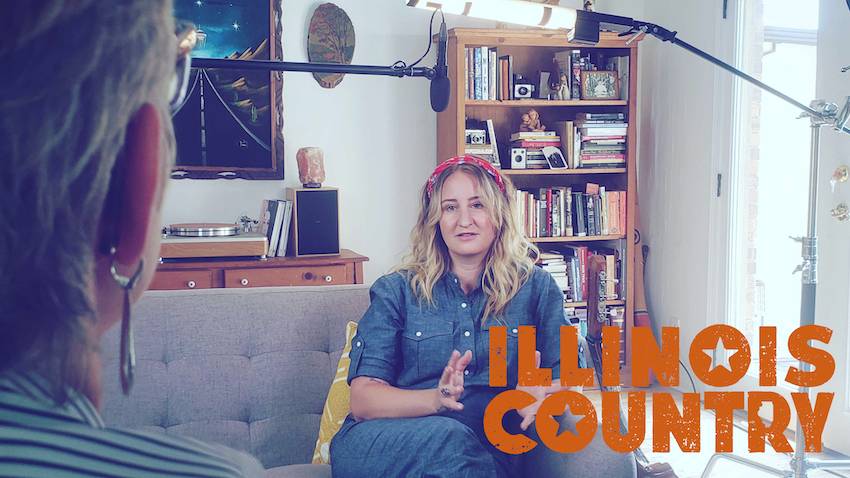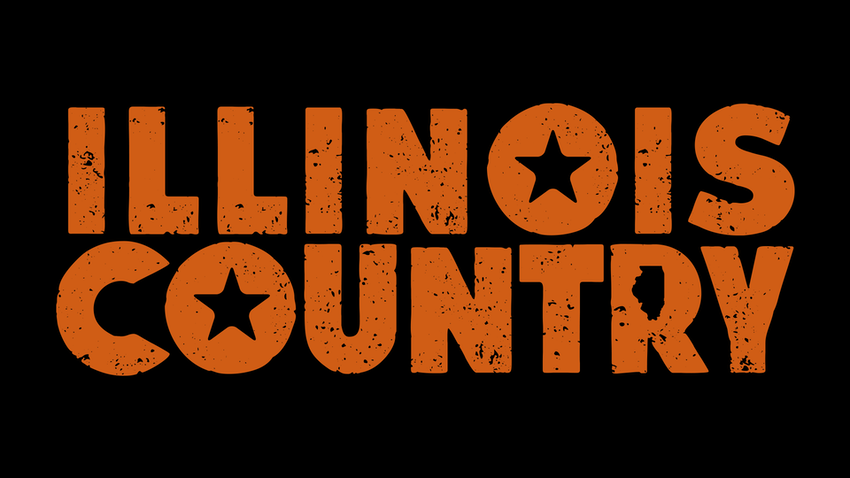Illinois Country, a new, one-hour documentary from Illinois Public Media, sets out to tell the story of country music from a new perspective. One which shows the impressive, yet often over-looked, history of Illinois’ influence on one of America’s native genres. The documentary carves a broad path, tracing history from the Barn Dance radio hours in Chicago to the native sons and daughters of Illinois who grace Nashville’s stages today.
Last week, I had a chance to sit down with director Sarah Weinstein Edwards and producer DJ Roach at Espresso Royale to chat about the documentary.
Smile Politely: So, let’s start at the beginning. How did it begin, the making of the documentary? Where did it come from?
Sarah Edwards: Well, I was hired in July of 2018 after sixteen and a half years of freelancing in Los Angeles, largely doing music documentary-style work. A lot of behind-the-scenes “making of the album”-type work. A lot in the pop world. My supervisor at the time said, “You know, Ken Burns is coming out with this country music documentary, it’s 16 hours, and I want to localize it.” And, so, I said, “Well, that sounds, like, right up my alley.” Even though I know zero about country music. I do know that Alison Krauss went to my high school. That’s about it. Me, DJ, and a guy named Isaac Musgrave did it from start to finish.
DJ Roach: As she said, it originally started as a companion piece to Ken Burns’ documentary. Since we are a PBS station, we look for projects that either compliment these bigger projects — you know, they are really popular, all the Ken Burns stuff. So, yeah, it kinda started as a companion piece. I think one of the early [thoughts] — you know, at least on my end is — he was doing country music, so, okay, let’s do something about country music in Illinois. So, my first reaction was, “What country music is in Illinois?” And again, since Alison Krauss is from Champaign, you kinda know of her and hear of people from Illinois that ultimately go off to other places and become famous. But, for me, I thought it was going to be kind of hard to find something to, to fill and hour about Illinois country [music]. To my surprise, we could have done more — we could have gone longer. I was really not interested in doing a documentary about people who are from, in the country music genre, from Illinois and just move away and become famous. You know, who it says they’re from Illinois on their Wikipedia page, and therefore we claim them. I think what we wanted to do was show people who kinda still had a typical vibe about them that was distinct. A kind of a midwestern feel to what they were doing, even if they’re in Nashville.
SP: So, by highlighting these artists with deep connections to Illinois, would you say you tried to center Illinois in country music rather than country music in Illinois?
Edwards: It’s kind of a pride…You know, our viewing area is central Illinois. We wanted to create a careful divide between highlighting locally-based artists and innovators and Illinoisans who have gone on to Nashville to have big-time careers. We also took care to highlight peope like Jerry Milam, who founded one of the first recording studios in the state. He did REO Speedwagon, Dan Fogelberg, all these things. Marvin Lee, the granddaddy of country music around here who discovered Alison Krauss.
Roach: I think that was a big thing we wanted to do. You know, since being from [Champaign-Urbana], you would almost be tempted to do an hour-long feature on Alison Krauss and call it a day. She’s probably the most famous. She’s had the most success. So, I guess, on one hand you’d be tempted to feature her prominently. But, I think, we wanted to spread it out. Focus on that there is good country music that comes out of northern Illinois and southern. One thing that’s distinctive in Illinois is that there is everything from Chicago, heavy urban area, to really rural parts. So, there’s all kinds of different music that comes out of them. One thing we spotlight, too, is the rise of Alt Country that actually started down around Bellville. So, Uncle Tupelo kinda got the start to pioneer this new brand of country. I remember at the time thinking, “Oh, this is different!”

Image from the Illinois Country website
SP: So, what do you think this documentary offers for people who maybe aren’t interested in country music necessarily?
Roach: I’m not interested… I was not interested when this project first came up. I was like, “ugh, god. Anything but country.” I liked old country — Johnny Cash. I love history, and I would tell someone who isn’t interested in country music that it’s about its history. There’s not a lot of similarity between us and the Ken Burns. But one thing that’s similar is there’s a lot of history.
SP: Was that an active decision? To not make this like Ken Burns’ work.
Edwards: Yes. We really designed it to put someone on a ride and let them off on the end. I think it appeals to younger people who may not know about country music. It’s a real one-on-one on what country has been and is in the state of Illinois. It’s done in a really fast moving, dynamic way editorially. Interspersed in it, for all the haters of country music, is the making of a song. We teamed up the guy (Graham Edwards) who wrote “Complicated” and “Sk8r Boi” for Avril Lavigne with John Pennell, who is one of the best bluegrass writers in the game, and we document their back and forth. You see the song develop. You see them at their first meeting, to getting a demo going, taking it to the recording studio. And then we get the top players in Nashville to record the final product. It doesn’t get much better than that in terms of creating a song — take away the documentary, and the song alone is worth the watch.
Roach: It’s great because, like Sarah said, you are kind of on a ride. Especially in the song aspects of it. The way the documentary is put together, we do the stuff about Illinois country and then you see the early process of the song being made. Then we kinda dip back into it. So, I think you just see the different stages. From the first time they’re literally sitting in a room [together]… because I didn’t really know how a song was written. And it was really interesting to see it come to fruition. We weren’t really sure that it was going to work.
SP: So, start to finish, how long were you guys working on this project?
Roach: Oh, we started, we first started…
Edwards: January?
Roach: Yeah, we shot our first video then. So, yeah, I guess about a year? We did about 20 interviews, over 30 hours of footage.
Edwards: Yeah, there were a lot of people we wanted to interview but couldn’t because of time and money. John Prine, you know, because of his health.
SP: So, what’s next? What’s the next project?
Edwards: Well, we have a second season of this series called Classical BTS which is a look at the lives of classical musicians around, uh, this area and the state. So, we’re going to do a second season of that. Like, six episodes?
Roach: So, one of the things that was also born out of this was a live series of performances in conjunction with Illinois Country called Illinois Country Live. We’re great with coming up with creative names. I don’t know how many of those we’ll do.
Edwards: Yeah, so WILL might become the country-bluegrass member station, ha-ha.
SP: So, if there’s one thing that you want viewers to get from this documentary, what is it?
Roach: So, I guess, like the way I was coming into it, I was very — and I am a music fan and a history fan — but I didn’t think this warranted doing a documentary on country music and Illinois. But you will learn, maybe, “Oh, yeah, there is something to this thing.” From, again, maybe it’s because I am more of a history buff, the early on portions [of the documentary] talking about how, like, Illinois being a place that had these three rivers that kinda merged and all these musics came along them and met and merged over time… I think it’s very interesting, the early barn dance radio, that I think is very interesting and people should know about. It’s pretty significant.
Edwards: It’s a great education on, not only Illinois country music history, but country music history in general. I think another interesting thing that I learned, you know when I first started interviewing people, I was like, “well what about this issue about what is ‘real’ country music and what is not?” It was really interesting to hear people’s responses. Don Cusic, who is a professor at Belmont, nailed it. This is what people should figure, when he said that the country music that you love in your formative years, whatever it is, that is your classic country. And no one can take that away from you… So, I guess, one thing I want people to know, number one, is that country music is story-based music and is worth the listen. If you’ve never considered it, this documentary is great. You get a sense of the different styles, so you get an education on what country music. B, you learn what country music is for you. And third, you get a broad idea of what country music is out there and what has been made by Illinois musicians.
SP: Well, thank you both so much for sitting down with me.
llinois Country will premiere on WILL-TV starting on March 2nd at 7 p.m. If you miss it, it will air again on March 6th at 7:30 p.m. The documentary has been picked up by a number of PBS member stations, so be sure to check your local listings. You can also check out their website, to see extra interviews, behind-the-scenes footage, and much more.








